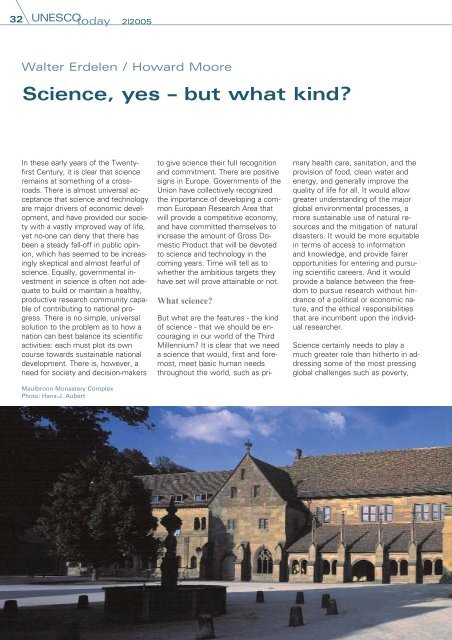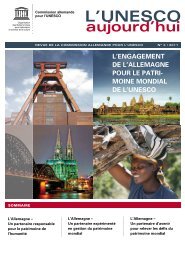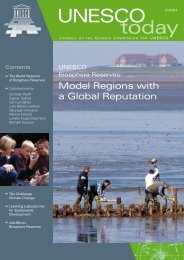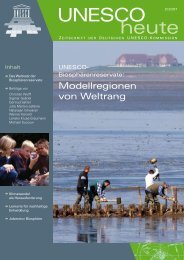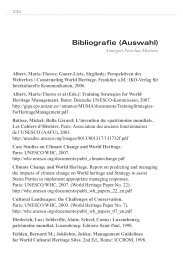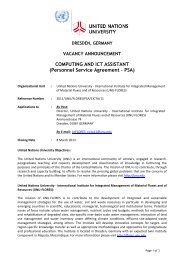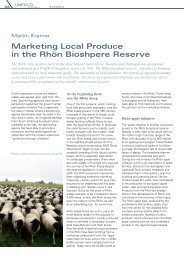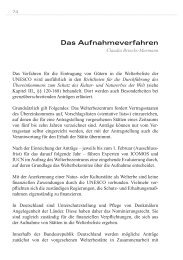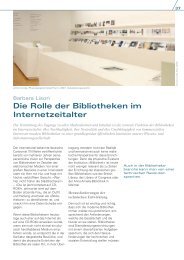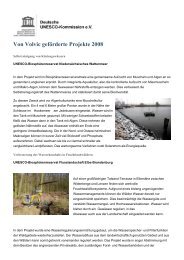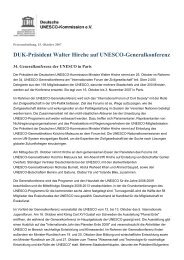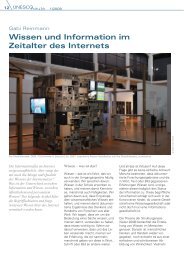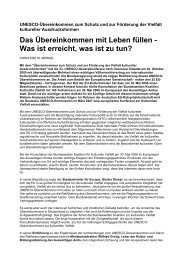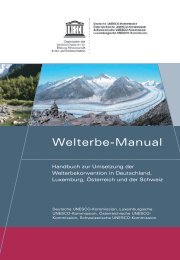Download - UNESCO Deutschland
Download - UNESCO Deutschland
Download - UNESCO Deutschland
Create successful ePaper yourself
Turn your PDF publications into a flip-book with our unique Google optimized e-Paper software.
32<br />
<strong>UNESCO</strong> today<br />
2|2005<br />
Walter Erdelen / Howard Moore<br />
Science, yes – but what kind?<br />
In these early years of the Twentyfirst<br />
Century, it is clear that science<br />
remains at something of a crossroads.<br />
There is almost universal acceptance<br />
that science and technology<br />
are major drivers of economic development,<br />
and have provided our society<br />
with a vastly improved way of life,<br />
yet no-one can deny that there has<br />
been a steady fall-off in public opinion,<br />
which has seemed to be increasingly<br />
skeptical and almost fearful of<br />
science. Equally, governmental investment<br />
in science is often not adequate<br />
to build or maintain a healthy,<br />
productive research community capable<br />
of contributing to national progress.<br />
There is no simple, universal<br />
solution to the problem as to how a<br />
nation can best balance its scientific<br />
activities: each must plot its own<br />
course towards sustainable national<br />
development. There is, however, a<br />
need for society and decision-makers<br />
Maulbronn Monastery Complex<br />
Photo: Hans-J. Aubert<br />
to give science their full recognition<br />
and commitment. There are positive<br />
signs in Europe. Governments of the<br />
Union have collectively recognized<br />
the importance of developing a common<br />
European Research Area that<br />
will provide a competitive economy,<br />
and have committed themselves to<br />
increase the amount of Gross Domestic<br />
Product that will be devoted<br />
to science and technology in the<br />
coming years. Time will tell as to<br />
whether the ambitious targets they<br />
have set will prove attainable or not.<br />
What science?<br />
But what are the features - the kind<br />
of science - that we should be encouraging<br />
in our world of the Third<br />
Millennium? It is clear that we need<br />
a science that would, first and foremost,<br />
meet basic human needs<br />
throughout the world, such as pri-<br />
mary health care, sanitation, and the<br />
provision of food, clean water and<br />
energy, and generally improve the<br />
quality of life for all. It would allow<br />
greater understanding of the major<br />
global environmental processes, a<br />
more sustainable use of natural resources<br />
and the mitigation of natural<br />
disasters. It would be more equitable<br />
in terms of access to information<br />
and knowledge, and provide fairer<br />
opportunities for entering and pursuing<br />
scientific careers. And it would<br />
provide a balance between the freedom<br />
to pursue research without hindrance<br />
of a political or economic nature,<br />
and the ethical responsibilities<br />
that are incumbent upon the individual<br />
researcher.<br />
Science certainly needs to play a<br />
much greater role than hitherto in addressing<br />
some of the most pressing<br />
global challenges such as poverty,


